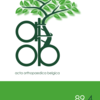Female representation in orthopedic surgery: where do we stand in Belgium ?
female orthopedic surgeon, diversity, women doctors
Published online: Jan 08 2024
Abstract
Female underrepresentation in Orthopedic Surgery and Traumatology is a well-known issue worldwide, including in Belgium. Most of the literature comes from northern America. This two-part study aims to quantify the female workforce in orthopedic surgery in Belgium and assess the presence of unconscious biases among active orthopedic surgeons. Epidemiological data from national registries, orthopedic societies and universities in Belgium were analyzed. This included data on medical students, residents, active orthopedic surgeons and awards given by a Belgian orthopedic society. Additionally, a questionnaire was administered to Belgian orthopedic surgeons, assessing their perceptions of gender stereotypes and potential unconscious biases. 90 participants responded with 70% of men and mean age was 36 years old.
The data revealed that 12% of active orthopedic surgeons in Belgium were women in 2020. However, the representation f women was higher among residents, with a thirty percent distribution. In one university, women had a slightly higher
chance of getting accepted in the orthopedic training then men.
The questionnaire results indicated the presence of unconscious bias regarding subspecialties, which aligned with the actual distribution. Women tend to specialize more in upper limb surgery and pediatrics while men focus more frequently on lower limb surgery.
The findings highlight the need for addressing the underrepresentation of women in orthopedic surgery and traumatology in Belgium. If the current rate of progress continues, it is projected that 30% of active orthopedic surgeons will be female by the year 2074. Identifying and addressing factors contributing to the underrepresentation, such as lack of mentorship, unconscious biases, visibility issues, and discrimination, is crucial for empowering future female orthopedic surgeons and fostering diversity in the field. Collaboration among European universities and orthopedic societies can play a vital role in reducing barriers and promoting gender equality in orthopedic surgery and traumatology.
